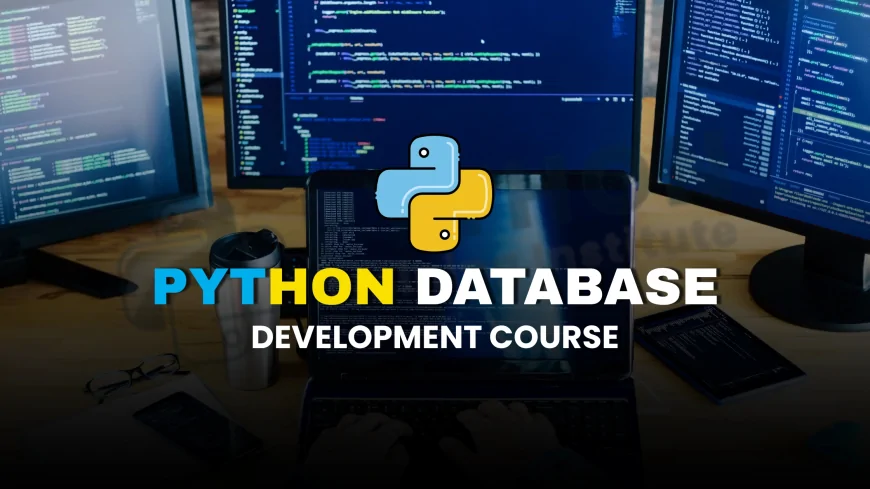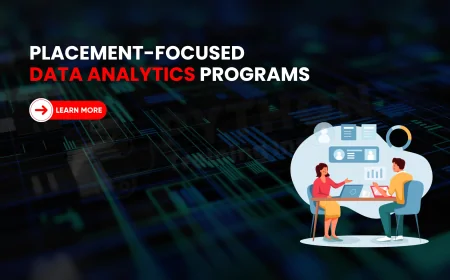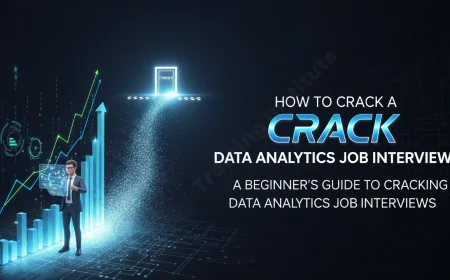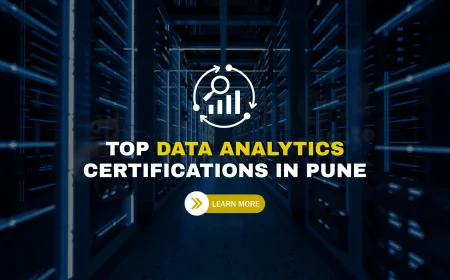Python Database Application Development Course Pune | Python Course for Building Database Applications in Pune
Enroll in the best Python database application development course in Pune. Learn SQL, MySQL, PostgreSQL, Flask, Django, ORM, and build real-world CRUD projects with certification.

Table of Contents
- Why Learn Python for Database Application Development?
- Course Overview & Objectives
- Core Skills You Will Acquire
- Databases Covered in the Course
- Framework Integrations: Flask, Django, and APIs
- Hands-On Projects You'll Build
- Top Institutes in Pune Offering This Course
- Certification & Career Support
- Career Opportunities & Job Roles
- Course Format, Fees & Duration
- Who Should Enroll?
- FAQs
- Conclusion
Why Learn Python for Database App Development?
Python dominates database development spaces owing to:
- Clear, readable syntax ideal for backend logic
- Rich libraries such as sqlite3, SQLAlchemy, and psycopg2
- Integration capabilities with frameworks like Flask and Django
- Scaffold rapid CRUD applications with minimal boilerplate
- Strong support for REST APIs and microservices architecture
Course Overview & Objectives
The course aims to transform you from beginner to confident backend developer by the end of the program. Key objectives include:
- Know SQL fundamentals, schema design, and normalization
- Master Python database drivers and connectors
- Learn ORM (Object-Relational Mapping) with SQLAlchemy
- Build RESTful APIs integrated with databases
- Create and deploy full-stack CRUD applications
- Understand database optimization, transactions, and security best practices
Core Skills You Will Acquire
- SQL queries: SELECT, INSERT, UPDATE, DELETE
- Joins, indexes, views, and stored procedures
- Database connection pools
- ORM concepts and model relationships
- Database migrations with Alembic/Django ORM
- API development: JSON responses, routing, error handling
- Basic database security and user management
Databases Covered in the Course
- SQLite: Embedded, file‑based database for rapid prototyping
- MySQL / MariaDB: Popular open‑source RDBMS
- PostgreSQL: Advanced RDBMS with JSON and geospatial support
- MongoDB: NoSQL document database for flexible schema needs
- Redis: In‑memory key-value store for caching
Framework Integrations: Flask, Django, and APIs
Integrating Python with web frameworks helps build full-fledged applications:
- Flask: Lightweight framework—ideal for microservices
- Django: Built‑in ORM, auth, migrations, and admin support
- REST APIs: Learn to design and secure APIs
- Serialization: JSON, marshmallow, Pydantic
Hands-On Projects You’ll Build
The course emphasizes real-world project work, such as:
- User registration and authentication system
- Inventory management web app with Flask + MySQL
- Blog platform using Django ORM and PostgreSQL
- Employee database app with MongoDB
- API service for e-commerce with Redis cache layer
- Data analytics dashboard with database back-end and charts
Top Institutes in Pune Offering This Course
WebAsha Technologies stands out in Pune as a premier training institute for the **Python Database Application Development Course**. Renowned for its practical approach and industry-grade curriculum, WebAsha equips learners with skills to design, build, and deploy database-driven Python applications effectively.
Why WebAsha Leads in Pune for This Course
- Comprehensive Curriculum: Covers Python + SQL, ORM (SQLAlchemy/Django), Flask & Django integration, CRUD operations, database migrations, and deployment strategies.
- Expert Mentors: Instructors are seasoned developers with real-world exposure to backend architectures and large-scale database systems.
- Hands-on Project Focus: Emphasis on real-life applications like inventory systems, blogging platforms, user-auth modules, and analytics dashboards.
- Cloud and Deployment Training: Covers deploying apps on platforms like Heroku, AWS, or DigitalOcean.
- Placement and Career Support: Comprehensive resume workshops, mock interviews, live project certifications, and job connections with startups and SMEs.
Skills Gained at WebAsha Pune
- Writing efficient SQL queries and designing normalized schemas
- Using ORM with SQLAlchemy and Django models
- Building RESTful APIs with Flask/Django interfaced with databases
- Managing database migrations and version control
- Deploying Python database applications on cloud servers
- Implementing authentication and security best practices in database apps
WebAsha Technologies, Pune is the ideal choice for learners seeking a course that blends strong backend fundamentals, deployment proficiency, and career readiness. With its project-driven approach and active placement guidance, WebAsha ensures you graduate with both skills and confidence to build robust database applications.
Certification & Career Support
Programs include:
- Course completion certificate
- Digital badges for Python and database modules
- Internship or project-experience letter (where applicable)
- Resume guidance and mock interview sessions
- Placement assistance with partner IT companies in Pune
Career Opportunities & Job Roles
- Backend Developer – Python & Databases
- Full-Stack Developer
- Data Engineer
- API Developer
- DevOps Engineer (with DB CI/CD skills)
Typical pay range: ₹4–12 LPA for freshers/intermediate roles, ₹12–25+ LPA for experienced developers.
Course Format, Fees & Duration
- Duration: 8–20 weeks
- Mode: Online live, classroom, hybrid
- Fees: ₹25,000–₹75,000 varying by duration and institute
- Batches: Weekday, weekend, evening, fast-track
- Tools: VS Code, MySQL Workbench, pgAdmin, Mongo Compass
- Lab Access: WebAsha Cloud Lab access for real-time development and experimentation
Who Should Enroll?
- Software developers entering backend roles
- IT professionals transitioning to data-driven applications
- Engineers building full-stack solutions
- Freshers aiming to land Python backend jobs in Pune
- Data-oriented professionals automating APIs or data storage
FAQs
1. Do I need prior SQL knowledge?
A basic understanding helps, but the course covers SQL fundamentals from scratch.
2. Is database application development different from web development?
Yes—this focuses on backend data logic rather than frontend design.
3. What are the prerequisites?
Basic Python programming and understanding of programming logic.
4. Do I need to install databases on my laptop?
Yes—MySQL, PostgreSQL, MongoDB and tools like pgAdmin will be installed.
5. Will I learn ORM tools?
Yes—ORM with SQLAlchemy in Flask and with Django’s built-in ORM.
6. Is this course project-based?
Definitely—projects make up 60–80% of learning.
7. Will I learn REST APIs?
Yes—all applications expose APIs for data operations.
8. Is deployment included?
Some programs include deployment on Heroku/AWS.
9. What job roles am I eligible for?
Backend Developer, API Developer, Data Engineer, Full‑Stack Developer.
10. Do institutes offer placement assistance?
Yes—WebAsha include placement support.
11. Are there weekend batches?
Yes, weekend and evening batches are common.
12. How long does it take to become proficient?
Typically 3–5 months with regular learning.
13. Is ORM mandatory to learn?
Yes—ORM abstracts SQL and speeds up development.
14. Can I learn both Flask and Django?
Yes—most courses cover both frameworks.
15. Will I work with NoSQL databases?
Yes—MongoDB is commonly included in coursework.
16. Do I need to know frontend technologies?
Basic HTML/CSS is helpful but not required.
17. Is the certificate industry-recognized?
Yes—especially from reputed Pune institutes.
18. Can I take this course online?
Yes—live online and hybrid formats are available.
19. What tools will I use?
VS Code, MySQL Workbench, pgAdmin, Docker (optional).
20. How do I enroll?
Visit the institute’s website, fill out the enrollment form, or contact their Pune admissions team.
Conclusion
The Python Database Application Development Course in Pune is designed to build foundational and advanced skills in backend development using Python and databases. From SQL basics to ORM, API integration, and real-time applications, this course prepares you for high-demand roles in development and data engineering. By the end, you’ll not only write complex database queries but also create deployable applications that interact with SQL and NoSQL systems. It’s an invaluable step toward becoming a full-stack developer or data-driven engineer. Enroll today and future-proof your career in backend technologies!
What's Your Reaction?
 Like
0
Like
0
 Dislike
0
Dislike
0
 Love
0
Love
0
 Funny
0
Funny
0
 Angry
0
Angry
0
 Sad
0
Sad
0
 Wow
0
Wow
0
















